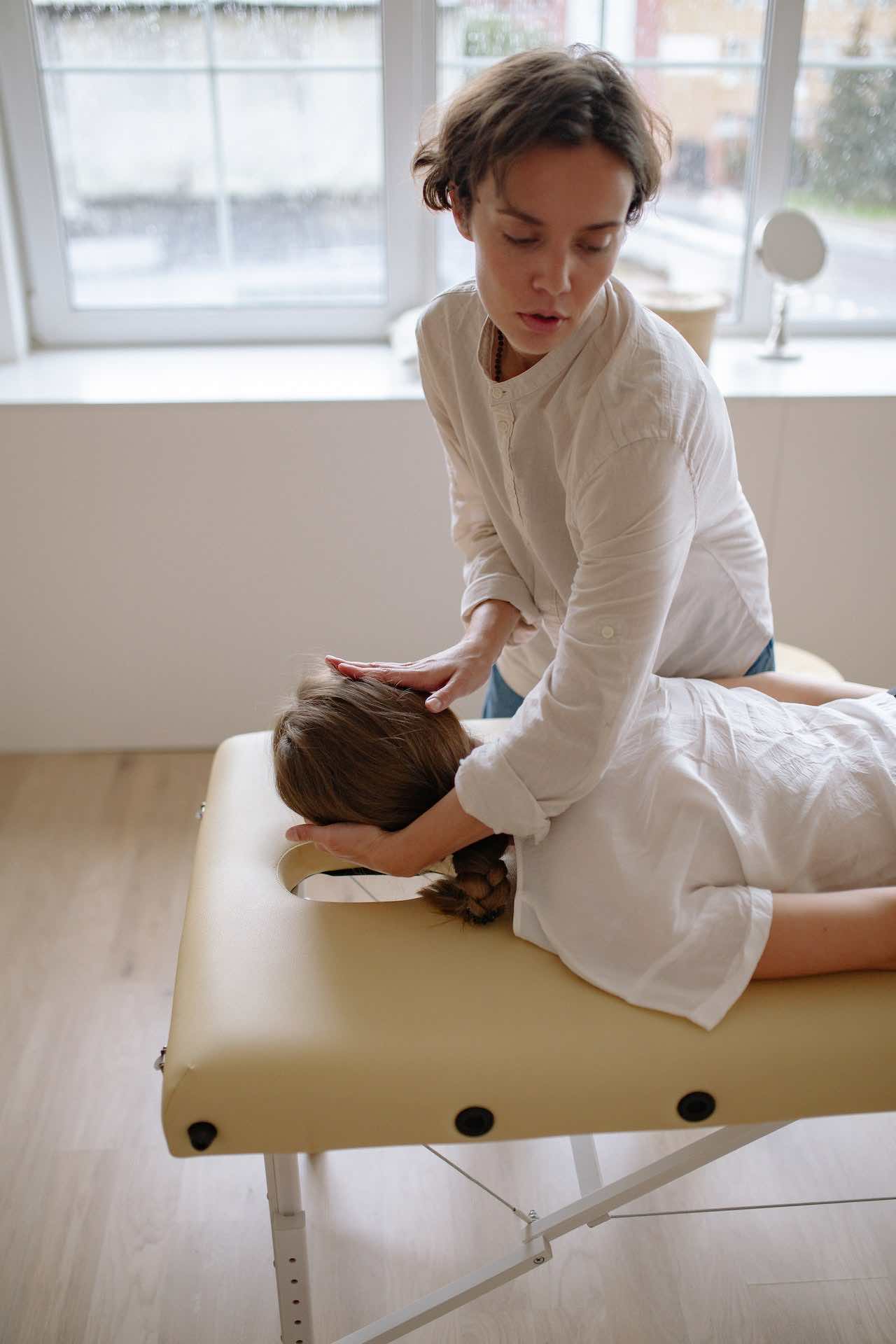I. Introduction
A. Explanation of the importance of finding a good massage therapist
Massage therapy is a popular form of alternative healthcare used for centuries to promote relaxation, reduce stress, and relieve pain. It involves manipulating muscles, tendons, ligaments, and other soft tissues to improve circulation, increase flexibility, and enhance overall physical and mental well-being.
However, not all massage therapists are educated equally, and finding the right one for your needs is important for getting the most out of your massage experience. Whether seeking relief from chronic pain or simply looking to unwind and de-stress, a good massage therapist can make all the difference.
B. Overview of what the article will cover
This article will discuss the essential steps for finding the best massage therapist for your needs. We will cover determining your massage goals and requirements, researching massage therapists, evaluating a therapist’s skill and experience, considering personal compatibility, assessing the therapist’s business practices, and trusting your instincts. You can find a massage therapist who is able to help you reach your health and wellness goals by following these steps.
Now, let’s dive into how to find the best massage therapist.
II. Determine Your Massage Goals and Needs
A. Identifying what you want to achieve with massage therapy
Massage therapy is a powerful tool that can help you achieve various health and wellness goals. Whether you’re looking to reduce stress, relieve pain, or improve your overall sense of well-being, massage therapy can help. The first step in finding the best massage therapist for your needs is identifying what you want to achieve with massage therapy.
Do you suffer from chronic pain or tension in your muscles and joints? If so, a deep tissue massage or trigger point therapy may be your best choice. These types of massage focus on specific body areas to relieve pain and promote healing.
Are you feeling stressed or anxious? A relaxation or Swedish massage may be the best choice for you. These types of massage focus on relaxation and stress relief, using gentle, flowing strokes to help you unwind and de-stress.
Do you have a specific health condition, such as sciatica, fibromyalgia, or arthritis? Finding a massage therapist with experience working with clients with similar conditions is essential in this case. They can help you develop a customized treatment plan that addresses your specific needs and helps to improve your symptoms.
B. Considering your specific needs, such as injury rehabilitation or stress relief
It’s also important to consider your specific needs when choosing a massage therapist. Do you have an injury that requires rehabilitation or a specific area of your body that needs extra attention? If so, it’s essential to find a massage therapist with experience working with these issues.
On the other hand, if you’re expecting stress relief or relaxation, choose a massage therapist who specializes in these areas. Look for a therapist who can create a calming environment and provide techniques that promote relaxation, such as aromatherapy or hot stones.
C. Deciding on the type of massage that would best suit your goals and needs
There are many different types of massage, each with unique benefits and techniques. Some common types of massage include:
- Swedish massage – the type of massage that uses long, flowing strokes to promote relaxation and relieve muscle tension.
- Deep tissue massage – the type of massage that uses firm pressure and slow strokes to target the deeper layers of muscle tissue and connective tissue.
- Sports massage – the type of massage is designed to help athletes be prepared for and recover from physical activity and can also help to prevent injuries.
- Trigger point therapy – the type of massage focuses on specific areas of the body where muscles are tight and painful and applies pressure to release the tension.
- Hot stone massage – the type of massage uses heated stones to help relax the muscles and promote relaxation.
You can choose the best type of massage by considering your goals and needs and the benefits of each type of massage.
III. Researching Massage Therapists
A. Searching for local massage therapists
When looking for a massage therapist, one of the first things to do is search for local therapists in your area. You can do this by using a search engine or online directory or asking friends and family for recommendations.
When searching for massage therapists, be sure to look for those who specialize in the type of massage you’re interested in. For example, if you’re looking for deep tissue massage, search for therapists who offer this type of massage.
B. Reading online reviews and ratings
Reading online reviews and ratings can be a great way to get a sense of a massage therapist’s reputation and the experiences of other clients. Look for reviews on websites like Yelp, Google, the therapist’s website, or social media pages.
However, remember that not all online reviews may be accurate or trustworthy. Be sure to read various reviews and look for patterns or common themes that may indicate the therapist’s quality of service.
C. Asking friends and family for recommendations
Asking friends and family for recommendations can be a great way to find a massage therapist with a good reputation and who you can trust. If someone you know has had a positive experience with a massage therapist, ask them for their contact information and give them a try.
D. Checking the therapist’s credentials and certifications
Before choosing a massage therapist, checking their credentials and certifications is essential. Ensure that they are licensed and insured in your state and have completed the necessary training and education.
You can find this information on the therapist’s website or by asking them directly. Additionally, many states have licensing boards or professional organizations that maintain databases of licensed massage therapists. You can check these databases to verify a therapist’s license and credentials.
E. Verifying the therapist’s license and insurance
Verifying a massage therapist’s license and insurance is essential in choosing the right therapist. Ensure that they are licensed and insured in your state and that their insurance covers the type of massage you want.
You can find this information on the therapist’s website or by asking them directly. If you have any doubts or concerns, you can also contact your state’s licensing board or professional organization for more information.
V. Evaluating a Massage Therapist’s Skill and Experience
A. Inquiring about the therapist’s years of experience
One of the first things to ask a potential massage therapist is how many years of experience they have. The more experience a therapist has, the more likely they are to have developed their skills and be able to provide effective massages.
However, remember that years of experience alone are not always an indicator of skill. It’s also important to look at other factors, such as the therapist’s education, training, and successful client outcomes track record.
B. Requesting a consultation or initial appointment to discuss your needs
It is a good idea to request a consultation or initial appointment with a potential massage therapist to discuss your needs and evaluate their technique and communication style. This will allow you to understand if the therapist is a good fit for you and can provide the type of massage you’re looking for.
During the consultation or appointment, be sure to communicate your needs clearly and ask the therapist any questions you may have about their approach and technique. This will help you determine whether the therapist fits you well.
C. Checking the therapist’s track record of successful client outcomes
A massage therapist’s track record of successful client outcomes can indicate their skill and expertise. Check reviews and testimonials from past clients that show that the therapist was able to help them achieve their massage goals and address their specific needs.
It’s also a good idea to ask the therapist for references that you can contact to learn more about their experiences working with the therapist.
D. Researching the therapist’s professional background and training
Before choosing a massage therapist, it’s essential to research their professional background and training. Look for therapists who have completed accredited massage therapy programs and have continued their education and training in their area of specialization.
You can find this information on the therapist’s website or by contacting them directly. Additionally, many professional organizations maintain databases of certified massage therapists that you can use to verify a therapist’s credentials and training.
VI. Considering Personal Compatibility
A. Checking the therapist’s communication style and interpersonal skills
When choosing a massage therapist, looking for someone with good communication skills and who makes you feel comfortable and at ease is essential. This will help you relax and get the most out of your massage experience.
Pay attention to the therapist’s communication style and interpersonal skills during your initial consultation or appointment. Do they listen attentively to your needs and concerns? Do they explain their approach and technique clearly and patiently? Do they make you feel comfortable and at ease?
B. Considering the therapist’s gender and touch pressure
Gender and touch pressure can be important factors when choosing a massage therapist. If you prefer a male or female massage therapist or for a particular touch pressure, communicate this with the therapist before your appointment.
Most massage therapists are trained to adjust their touch pressure to meet the needs and preferences of their clients. If you find the pressure too light or firm, or if you’re uncomfortable with the therapist’s touch in any way, be sure to communicate this with the therapist.
VII. Assessing the Therapist’s Business Practices
When choosing a massage therapist, it’s important to consider their business practices. Look for a therapist who has reasonable fees and a clear cancellation policy. Also, consider their availability and scheduling options, as well as their location and accessibility.
Here are some other things to consider when assessing a therapist’s business practices:
- Fees: Look for a therapist who has reasonable prices and who is transparent about their pricing. Be wary of therapists who offer very low costs, as this may be a sign of inexperience or poor quality service.
- Scheduling: Look for a therapist with flexible scheduling options that can accommodate your needs. Be sure to ask about their availability and how far you need to book an appointment beforehand.
- Cancellation policy: Look for a therapist who has a clear cancellation policy and is flexible about rescheduling appointments.
- Location and accessibility: Look for a therapist who is located in a convenient and accessible location. If you have mobility issues, look for a therapist on the ground floor or with accessible facilities.
VIII. Trusting Your Instincts
Finally, when choosing a massage therapist, it’s important to trust your instincts. If something doesn’t feel right or you don’t feel comfortable with a particular therapist, don’t be afraid to move on and find someone better for you.
By finding a qualified and experienced massage therapist who is a good fit for your needs and preferences, you can enjoy the many benefits of massage therapy and improve your overall health and well-being.




